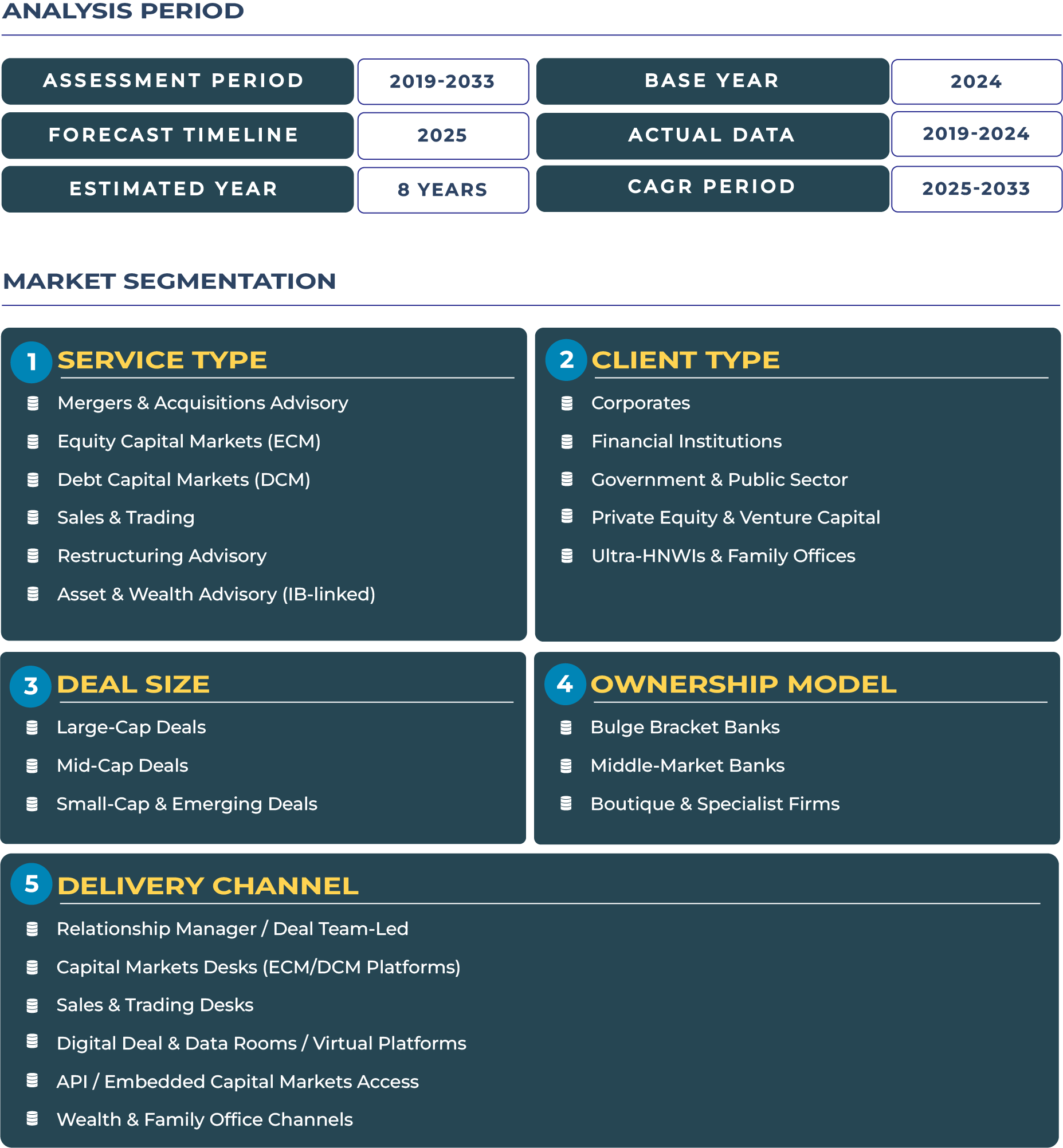Thailand Investment Banking Market Outlook: Accelerating Growth Through SME and Tourism-Linked Corporate Advisory
The Thailand Investment Banking Market is undergoing a strategic transformation, fueled by a surge in SME financing, tourism-related corporate advisory, and infrastructure-driven investments. As a key player in the ASEAN region, Thailand’s financial ecosystem continues to attract both domestic and international investors seeking diversified capital solutions. The market is expected to grow from USD 1.6 billion in 2025 to USD 3.4 billion by 2033, at a CAGR of 9.5%, according to DataCube Research. This growth reflects Thailand’s rising demand for mid-market advisory, cross-border deal structuring, and capital market participation supported by its strong tourism sector and government-backed SME development initiatives led by the Bank of Thailand and the Securities and Exchange Commission Thailand (SEC).
Note:* The market size refers to the total revenue generated by banks through various services.
Thailand’s Financial Ecosystem Strengthens Through SME and Tourism-Focused Advisory Services
Thailand investment banking landscape is becoming increasingly dynamic as the nation embraces a more diversified economic structure. The expansion of SME-focused advisory services and financing for tourism-linked enterprises has emerged as a significant growth catalyst. Investment banks are developing specialized products tailored for mid-market corporates, family-owned enterprises, and hospitality firms that dominate the Thai economy. Furthermore, Bangkok’s emergence as a regional hub for capital raising and equity listings supports a thriving Equity Capital Markets environment, while the Debt Capital Markets segment continues to see steady demand from infrastructure and energy projects. As Thailand implements reforms to attract foreign direct investment (FDI) and facilitate Public-Private Partnerships (PPPs), the investment banking sector is well-positioned to capitalize on the country’s evolving financing needs and growing appetite for sophisticated advisory solutions.
Drivers & Restraints: Key Forces Shaping Thailand Investment Banking Momentum
Driver: Tourism and Infrastructure Financing Catalyze Investment Banking Expansion
Tourism, one of Thailand’s largest economic contributors, continues to drive significant capital demand for hospitality development, aviation, and retail-linked infrastructure. The return of international visitors post-pandemic has accelerated the need for structured financing and mergers & acquisitions advisory in tourism-related sectors. The government’s emphasis on long-term infrastructure investments, such as the Eastern Economic Corridor (EEC), is attracting global and regional investors, boosting demand for project finance and debt syndication. Additionally, the rise of digital SMEs in Bangkok, Chiang Mai, and Phuket is fueling demand for customized financing solutions, positioning Thailand investment banking industry as a vital enabler of national economic diversification.
Restraint: Market Scale and Liquidity Constraints Limit Rapid Expansion
Despite a strong growth trajectory, Thailand investment banking market faces structural challenges. Its relatively smaller market capitalization and fragmented SME ecosystem restrict large-scale capital inflows compared to major regional financial hubs. Liquidity constraints in secondary markets and the limited presence of domestic institutional investors create headwinds for deepening the local capital market. Furthermore, complex regulatory approval processes and inconsistent tax frameworks occasionally slow deal execution, affecting investor sentiment. Addressing these structural issues, through financial reforms, investor protection enhancement, and tax incentives, will be crucial for sustaining the sector’s long-term momentum.
Trends & Opportunities: Mid-Market Advisory and Cross-Border Deals Drive Future Growth
Trend: Expansion of SME and Mid-Market Advisory to Strengthen Domestic Financing Ecosystem
Thailand investment banking sector is witnessing a growing focus on SME advisory and mid-market deal facilitation. As family-run businesses and medium-sized enterprises increasingly seek funding for expansion and digital transformation, investment banks are offering structured advisory and capital access services. The integration of digital tools, online investment platforms, and ESG-oriented financing frameworks is enabling banks to reach previously underserved segments. These trends are reinforcing the transition toward a more inclusive and resilient financial landscape capable of supporting Thailand’s post-pandemic recovery.
Opportunity: Cross-Border Advisory and Tourism-Linked Investment Open New Avenues
Cross-border merger and acquisition advisory and tourism-driven capital projects present strong opportunities for Thailand’s investment banks. Increasing collaboration with regional partners, especially from Singapore, Japan, and China, is enhancing access to foreign capital and diversified financing structures. For example, several Thai hospitality groups are exploring joint ventures with international investors to expand their footprints across Southeast Asia. Moreover, government-backed digital trade and investment facilitation initiatives are streamlining capital inflows, creating a favorable environment for investment banks to engage in cross-border financing and advisory roles aligned with the country’s tourism-led growth vision.
Competitive Landscape: Strategic Collaborations and SME-Focused Innovations Define Market Leadership
The Thai investment banking market is led by prominent domestic institutions such as Kasikornbank, Bangkok Bank, and Siam Commercial Bank (SCB), along with the presence of international firms like Standard Chartered and HSBC. In 2024, Kasikornbank launched its “SME NextGen Advisory” initiative, offering integrated financing and restructuring solutions for mid-sized enterprises in tourism, logistics, and manufacturing. Similarly, SCB’s investment arm expanded its digital platform for equity fundraising, enabling local startups and SMEs to attract foreign investors. These initiatives reflect the sector’s evolution toward digital-first, advisory-centric growth. Thailand’s banks are increasingly focusing on sustainability-linked deals and mid-market corporate finance to maintain competitiveness within ASEAN’s evolving financial ecosystem.
Conclusion
Thailand investment banking industry is on a path of accelerated transformation, leveraging its economic diversification agenda and strong tourism backbone. With robust regulatory oversight, expanding SME participation, and a growing appetite for cross-border advisory, the country is set to strengthen its role as a regional financial hub for mid-market financing and tourism-linked investments. The next phase of growth will depend on enhancing market depth, encouraging innovation, and aligning with digital transformation across the financial services spectrum.







